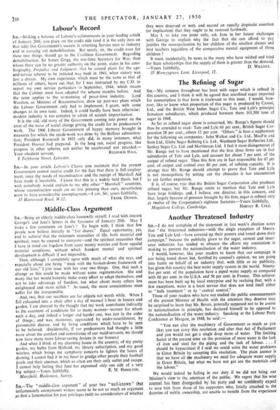Labour's Record
SIR,—Striking a balance of Labour's achievements in your leading article of January 20th, you place on the credit side (and it is the only item on that side) this Government's success in returning Service men to industry and in carrying out demobilisation. But surely, sir, the credit even for these two things should 'go to the Coalition Government. Regarding demobilisation, Sir James Grigg, the war-time Secretary for War, than whom there can be no greater authority on the point, states in his auto- biography, Prejudice and Judgment, that he caused plans for the age- and-service scheme to be initiated way back in 1941, when victory was Just a dream. My own experience, which must be the same as that of millions of others, bears out that, for I was instructed by my C.O. to report my own service particulars in September, 1944; which means that the Cabinet must have adopted the scheme months before. And
the same applies to the re-manning of peace-time industry. Lord Woolton, as Minister of Reconstruction, drew up post-war plans which the Labour Government only had to implement; I grant, with some changes to its own taste. Indeed, it could hardly have been otherwise: modern industry is too complex to admit of scratch improvisation.
It is the old, old story of the Government coming into power on the crest of the wave of social change getting the credit for its predecessor's work. The 1906 Liberal Government of happy memory brought in measures for which the spade-work was done by the Balfour administra- tion; President Roosevelt in 1933 only did, in many instances, what President Hoover had prepared. In the long run, social progress, like progress in other spheres, can neither be accelerated nor retarded.—










































 Previous page
Previous page